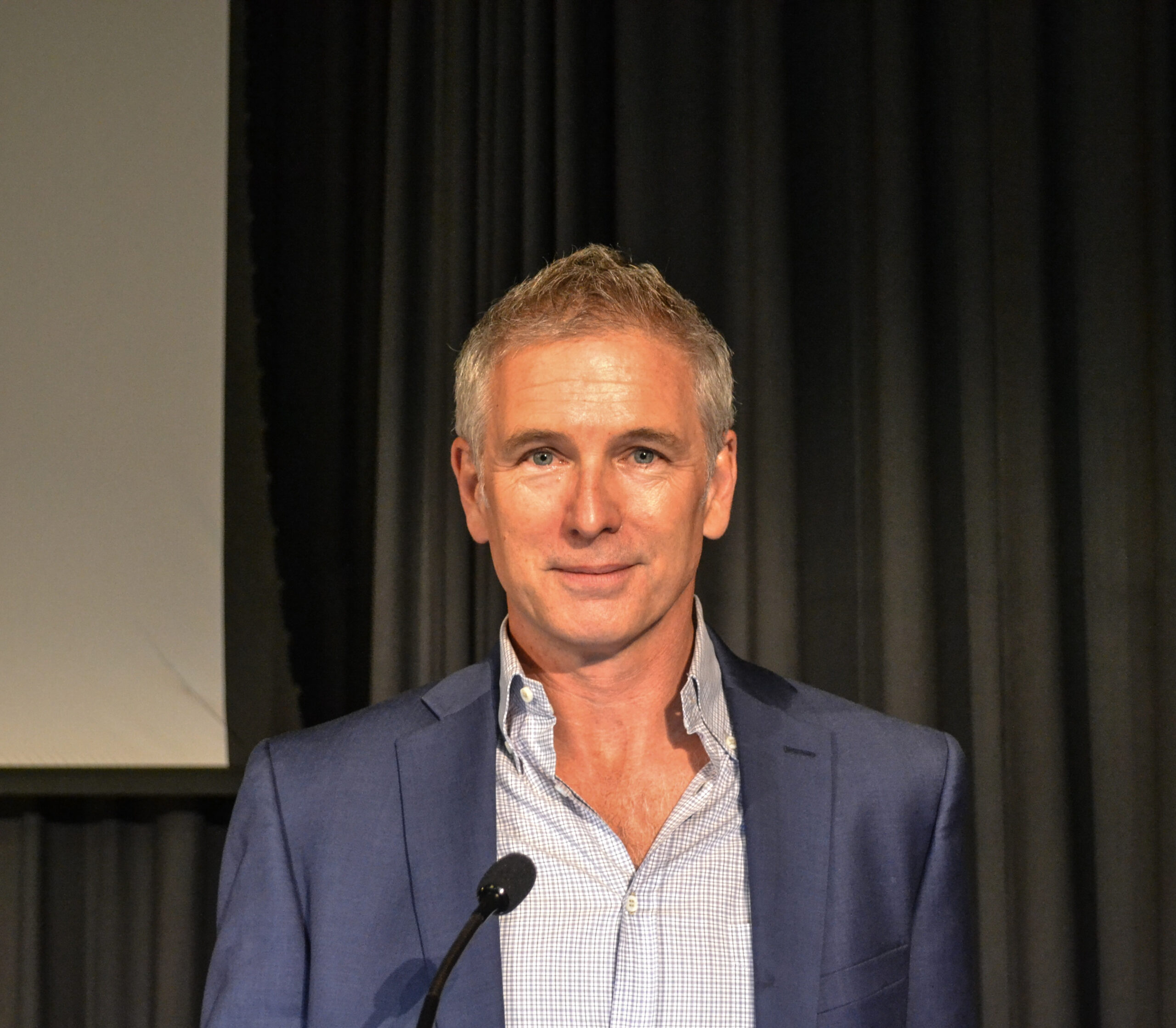Event discusses importance, healing of ocean
To wrap up the Fall semester Honors Colloquium, Wallace J. Nichols speaks about reevaluating our relationship to the oceans. PHOTO CREDIT: Nadia Sutryrina
For the ninth and final time, The University of Rhode Island held its honors colloquium on the ocean and sustaining our shores entitled “An Ocean State of Mind: In Crisis, Opportunity.”
Prior to the night’s speaker, Director of the Honors Programs Lynne Derbyshire thanked the colloquium’s coordinators, J.P. Walsh and Andrew Davies, for their work this semester.
“The speakers they’ve invited have been so informative about the complex relationships between humans and oceans, and we are deeply grateful to them,” Derbyshire said.
Walsh and Wanda Hopkins, a member of the URI Native American Advisory Council, acknowledged the event and the University’s location on Indigenous Narragansett land.
The event’s speaker Wallace J. Nichols, an author and activist for water and ecosystems, highlighted previous Honors Colloquium topics from this semester He told the audience that he spent time “binge-watching” previous Honors Colloquium events from this years’ series as well as years prior.
He referenced researcher Rashid Sumalia, who spoke at a previous Honors Colloquium this semester about the economics of fish and fisheries, and the idea that fish are more valuable in this world than diamonds, for example, to the planet. He quoted chef Barton Seaver, another speaker at a previous colloquium who discussed marine food systems and the idea that our choices of how we interact with nature can heal it.
He said in his presentation that when we undervalue the water, tragedy can occur, and his goal is to make people re-evaluate their relationships with the ocean. He referenced the words of Hopkins and other Indigenous leaders who spoke at previous events.
“Wanda and the other Indigenous leaders have brought their prayers, their songs, their stories, their love, their deep connection to share, and I think we all have much to learn from that perspective,” Nichols said.
Nichols then referenced last week’s colloquium on plastic and marine pollution. He discussed what it’s panelists said about the topic of pollution, acknowledging and agreeing with their conclusions that we need to learn where to use our research to make a plan to improve the health of the ocean.
He presented a picture of a Rhode Island license plate to the audience.
“Every time you see this Ocean State license plate, which might be daily or several times a day, depending on how much traffic you’re driving in and how many cars you go by, I want you to reflect,” he said. “Use that as a queue to reflect on this semester and what you’ve learned about yourself and our ocean planet and that intricate, intimate relationship, that interdependence we have with our water planet.”
Nichols also discussed removing resources from the ocean, which he said is an issue right now.
“We are putting too much into the ocean in the form of various types of pollution,” he said. “We are taking too much out of the ocean, not just fisheries.”
He mentioned that people in general are wrecking the edge areas where progress can be made, whether it be where currents meet or coastal areas where economic activity is.
He talked about the spiritual healing of water, mentioning Tom Wren, a triple amputee who found peace in surfing, and suggested that water may have helped humanity find an identity.
“The first time we saw ourselves was in water,” he said. “We didn’t have mirrors. We didn’t have bathrooms. We didn’t have hallway mirrors or changing rooms.”
He also mentioned more on the emotional connection to water and the symbolism, even mentioning Jim Crow laws with water fountains and pools in the past, as well as the Flint, Michigan water crisis, as examples of people being denied access to water.
At the end of his presentation, Nichols mentioned that the emotional benefits of water are important to preserving that water, too.
“We often talk about the ecological and economic benefits, but let’s also add emotional benefits,” Nichols said. “They are real. They’re quantifiable. They’re well studied and if you’re leaving them out, there’s really no reason other than you don’t know.”
Derbyshire announced that the Honors Colloquium series will continue in the fall of 2022 with the theme “Just Good Food.”





